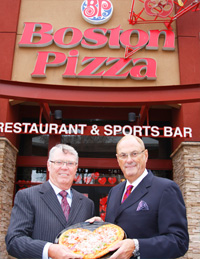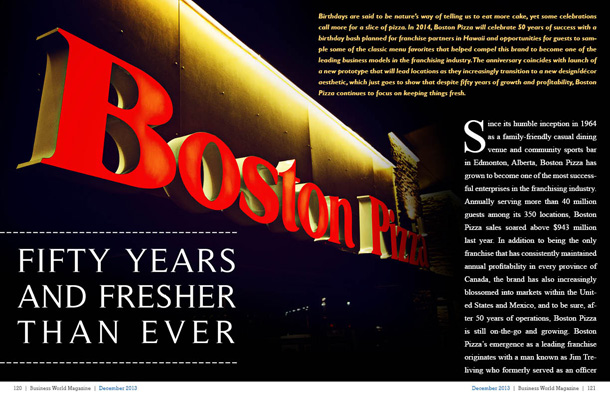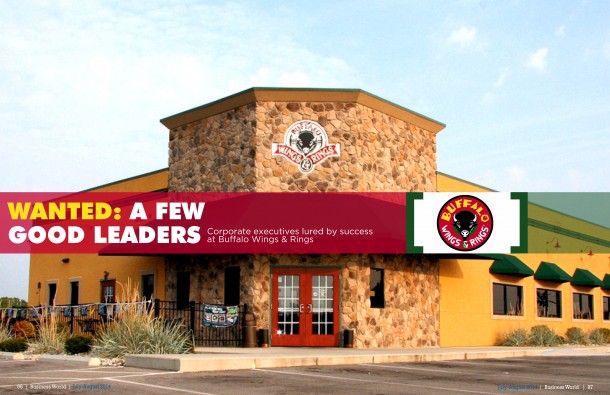

During a discourse pertaining to man’s persistent attempt to perfect his state of being, the great Roman statesman Cicero devised the term “Cultura Animi†– an expression that translates to cultivation of the soul. Over time, this original term would be adapted by other great thinkers who transformed its meaning to relate more to aspects of refinement or the attaining of higher learning and wisdom. But no matter how you slice it, when it comes to the leading Canadian pizza franchise, the critical component for attaining and cultivating success still comes down to that same concept, recognized today quite simply as “culture.â€
Outstanding products, service and determination may drive business for a time, but all will ultimately crash without the genuine acumen and professional savvy so needed to steer operations in the market. That’s a point keenly understood by principals of Boston Pizza, a franchise that, for half-a-century, has catered to consumers at what are some 350 locations punctuated among provinces of Canada, from one coast to the next. Achieving a renowned reputation, as well as return on investment, from dishing out fine food and drink isn’t something simply dependent on flavor; it also takes finesse. So, beyond the alluring atmosphere that elevates experiences within their sports-bars; and behind all the beckoning array of edible options on their menu, this is a franchise that reserves extraordinary (perhaps even excessive) attention to detail when it comes to partnering with potential franchisees. Their formula can be expressed as follows: Success + Success = More Success.
“We are a culturally driven organization,†says Chief Operating Officer Ken Otto. “We hire people that are very aligned with our culture.â€
Otto explains that potential franchisees MUST “come to the table demonstrating a very high level of success from something in their own life.†That success can come from running or owning a successful enterprise, or maintaining some type of leadership role at another successful company (not necessarily relating to restaurants). Boston Pizza partners with those that have been proven professionally, those who have secured not only enviable experience, but also a significant amount of net worth. Financial security is fundamental because the average Boston Pizza franchisee makes an investment of at least two million dollars.
Otto also assures that their brand of franchisee is anything but frivolous when it comes to investment strategy. “They’re committing a significant investment, so they’re looking for successful track record and we have one that no other casual dining chain can match, whether it is our system sales growth, same store sales growth, or new store sales growth. That track record gives them a great deal of comfort,†says Otto.
In addition to being Canada’s only casual dining brand that has financially prospered in every province, Boston Pizza has routinely achieved national recognition for its professional practices. Distinctions have included it being heralded among the best places to work as well as Top-10 ranking for “Most Admired Corporate Culture†– an honor that recognizes Canadian organizations whose cultural composite has helped enhance financial performance and consistent competitive advantage.
 Such recognition helps evidence that at the core of Boston Pizza is a business-minded brain trust which Otto understandably credits for so much of Boston Pizza’s prosperity. “Our franchisees have a passion for excellence, a passion for people and a never-ending desire to do something better than anyone else. It is these owners, and their entrepreneurial spirit, that has allowed us to connect with hundreds of thousands of guests.â€
Catering to Culture and Customers
There are unique differences between corporate culture and those engaged in a franchise culture. In the case of Boston Pizza, franchisees actually participate by offering feedback and making recommendations that ultimately benefit the whole. Otto says the exchange is very different from what typically occurs, for example, with general managers in a corporate structure. “Our franchisees are a great judge of what we’re doing, and they hold us to a different standard. As past executives, as owners of businesses, they have opinions that can help in all processes,†says Otto. “You have to take their insight and build it into what you do. Some companies fail to understand that, but we don’t because we’re working with a more sophisticated group of people.â€
Through its commitment to the franchising model, Boston Pizza has developed systems and tools strategically designed to empower franchisees to better achieve success. Essential to that is having a decentralized leadership team. Canada is big country, affirms Otto, and with 350 locations, he says it is important to remain close to operations. Boston Pizza has established corporate bases in Ontario, Montreal and Richmond. This decentralization has helped principals maintain “a line of sight on all those stores,†says Otto, adding that it also allows for enhanced communication and rapid response as needs or situations may dictate.
In 2011, Boston Pizza implemented a multichannel development strategy which gives franchisee candidates new options. Traditional locations have encompassed upwards of 6,000 square-feet operating space. This methodology allows for smaller locations strategically located in urban centers, from 3,000 square-feet to fast, casual concepts and counter services such as that recently created within Southern Alberta’s Institute of Technology.
Franchisees are also provided with training and resources that cover all aspects of operations and market function. Services include construction assistance that helps build sites, a real estate team that helps choose best sites for operation in any respective community, and a marketing team with widespread success at drawing crowds for planned openings. Franchisees undergo eight weeks of training which includes six weeks working within one of three corporately held locations.
The mindset that views the relationship with franchisees as a partnership also focuses on suppliers. For a company that has existed for more than 50 years, Boston Pizza has secured critical, long term relationships and the scope of its market presence now connotes to buying power when negotiating with vendors. Otto says franchise leaders routinely engage suppliers during “innovative sessions†which examine both current and future needs. Much like the exchange with franchisees, he says these sessions combine insight from the supplier with that of franchise leadership and it effectively empowers their team to determine directions that allow them “to stay ahead of the race.â€
To win that race, as with any good athlete, Otto affirms one needs a certain amount of flexibility, which, in this case, means ability to change. Boston Pizza maintain a seven-year renovation rule and guests are being greeted today by new décor themes complemented by wood and stone touches which add aesthetic appeal to the dining experience. While endeavors at other places may fall victim to that drab foreboding of dated duress, Otto says Boston Pizza’s intent is to reinforce the idea that its restaurants never grow old.
That holds true for the menu too. Boston Pizza recently launched a new menu with more than two dozen items of epicurean delight, while maintaining “heritage†items of which foodies are always fond. As for the hand-made, hand-pressed dough so utilized in their signature pizza making process, no worries; Otto says, “That will never change.â€
Otherwise, he says people expect change and it’s essential to never remain static. “Look at the most successful companies out there and you’ll see that they innovate and evolve. Great companies are agile, are nimble, and when it comes to innovating and leading change, we want to be first at the table … it shows customers that we care, “he says.
Serving Canada
And when it comes to care, to be sure, Boston Pizza has served so many beyond those who find a seat at the table or bar in the restaurants. The franchise has also established a foundation with more than $14 million in assets that has routinely supported a variety of important needs. From supporting causes that assist the fight against juvenile diabetes and world hunger, to its annual Valentine’s Day sale of iconic heart-shaped pizzas with proceeds benefitting Canada’s Heart and Stroke Foundation. While very proud of their heritage and optimistic of their future, Otto says Boston Pizza has never lost sight of the fact that their job is serving customers and treating them like welcome guests. Their success has given them capability to serve others, and Otto says that position is taken seriously. “We are very committed to Canada, and will continue to be.â€
The sense of service so inherent at Boston Pizza has an origin with the man responsible for launching the franchise. Before securing acclaim as a leading restaurateur, Jim Treliving served dutifully with the Royal Canadian Mounted Police. In 1968, he retired from the RCMP and purchased the rights to open a Boston Pizza in Penticton, British Columbia. According to legend, the very first Boston Pizza was opened in Edmonton by a Greek immigrant who just happened to be a fan of certain teams from Boston, Massachusetts. His restaurant, some say, was opened the very year the Bruins won the Stanley Cup. Patience, and a sense of humor withstanding, Treliving’s restaurant grew in popularity in Penticton. He later became professionally associated with a chartered accountant in George Melville. These two formed a partnership which resulted in the opening of 16 restaurants in British Columbia over a ten-year period. They went on to purchase the company and helped develop what exists today. The documenting of all that is accounted in a new book written by Treliving called “Decision’s – Making The Right Ones, Righting The Wrong Ones.â€
And for anybody weighing the decision to join the Boston Pizza franchise, Otto reminds it is important to possess the same virtues that fundamentally empowered Treliving and Melville to achieve success: passion for people, principled business and commitment to excellence.







